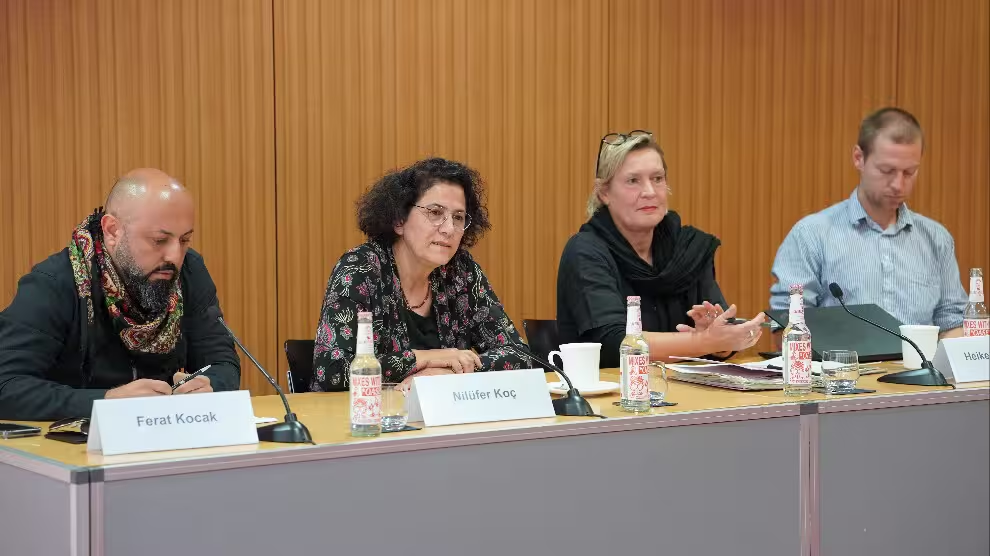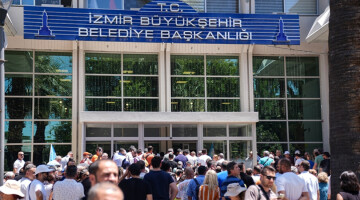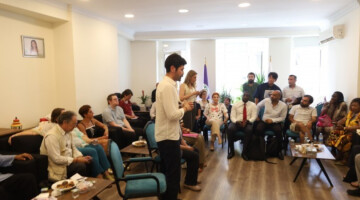On 22 November 1993, the then Minister of the Interior, Manfred Kanther, imposed a ban on the activities of the PKK (Kurdistan Workers’ Party) in Germany. This was followed by bans on numerous organisations and media that were accused of being part of the PKK structure. The PKK has been listed as a terrorist organisation by the EU since 2002. Since then, hundreds of Kurdish activists have been charged with violating these bans and with violating Sections 129a and 129b of the German Criminal Code, and some have been sentenced to long prison terms.
Lawyers applied to the German government on May 11, 2022 to lift the PKK ban. The government's response was reported to be negative.
At a joint press conference held by MAF-DAD and Civaka Azad at the Bundespressekonferenz in Berlin on Wednesday, lawyers announced that the ban on the PKK, which has been in place since 1993, was taken to court.
Lawyer Lukas Theune, who applied for the lifting of the PKK ban in 2022, Nilüfer Koç, spokesperson for the Kurdistan National Congress (KNK), and Ferat Koçak, member of the Federal Parliament for Die Linke, spoke at the press conference moderated by MAF-DAD Board Chair, lawyer Heike Geisweid.

Criminalization activities
Heike Geisweid provided information about the ban and the appeal filed with the government, recalling that the PKK had decided to dissolve itself at its congress held on May 5-7.
Pointing to the fact that the Turkish state has not yet established a legal and political basis and continues its attacks on Kurdish territories, Geisweid said, “The German state also continues its criminalization and ban on activities, which has far-reaching consequences for the Kurdish community living in Germany and constitutes an obstacle to the upcoming peace process.”
PKK files lawsuit
Geisweid reported that the government rejected the application on the grounds that it would “affect Germany's foreign policy interests and, in particular, jeopardize relations with Turkey,” and announced that the PKK had filed a lawsuit against the Federal Republic of Germany before the competent administrative court.
Lawyer Lukas Theune, representing the applicant, stated: “The PKK announced at a historic congress that it had dissolved itself and disarmed. It is now time to lift the ban in Germany in order to give the Kurdish movement and the minority the opportunity to organize so that the peace process can succeed.”
Lawyer Theune added, “The PKK has filed a lawsuit, and the case is ongoing at the Berlin Administrative Court. The grounds for the lawsuit are not against the idea of international peace; there is no security threat, and there is no threat to the peace process.”
Referring to the process that gained momentum with Abdullah Öcalan’s February 27 ‘Call for Peace and a Democratic Society,’ lawyer Theune said, “The State Department has announced that it will support the process initiated by Abdullah Öcalan. Therefore, the Berlin government should immediately support the declaration, including the lifting of the ban on PKK activities, which places the Kurdish people under general suspicion.”
The lawyer called on the authorities to accept the complaint filed for the lifting of the PKK ban and to lift the ban.
Die Linke: The right step must be taken
Speaking at the press conference, Ferat Koçak, a member of the Federal Parliament for the German Left Party, Die Linke, said, “Die Linke has always been in favor of lifting the PKK ban.”
Koçak emphasized, “The right step must be taken to send a signal for peace in Kurdistan and Turkey.”
Nilüfer Koç: Berlin should support the peace process
KNK spokesperson Nilüfer Koç recalled that the German government had issued a statement supporting Öcalan’s call, adding, “However, this requires that words be followed by actions; it requires support for the process.”
Nilüfer Koç remarked that, “The Kurdish side took great risks and is approaching the issue with a sense of responsibility. Even Recep Tayyip Erdoğan and Devlet Bahçeli responded positively, but we cannot understand why the PKK ban continues to apply to Kurds in Germany.”
Calling on Berlin to “refrain from pouring fuel on the fire” and to “support the peace process,” Nilüfer Koç stated, “This includes the release of all those working for peace (...) We expect Berlin to promote peace and not create obstacles.”













